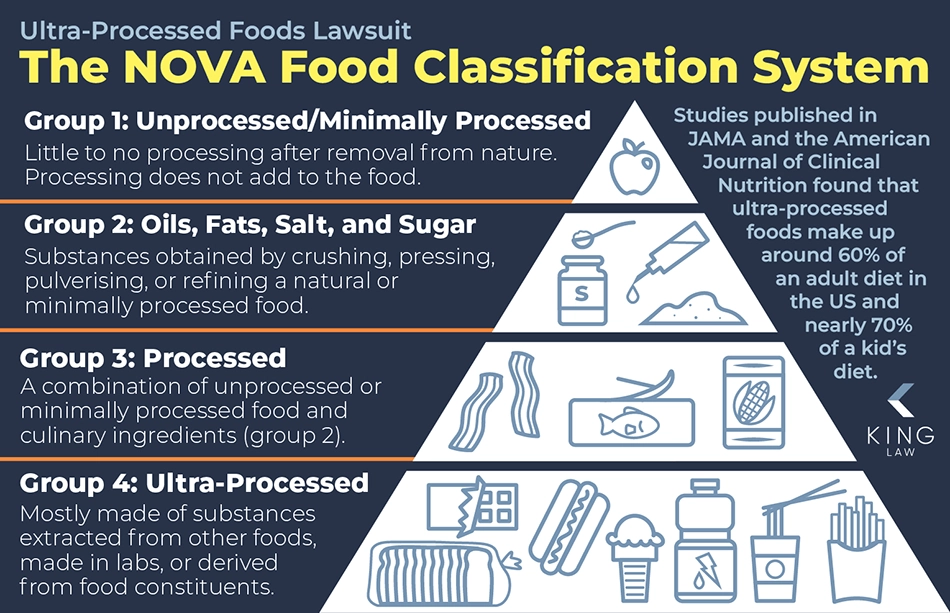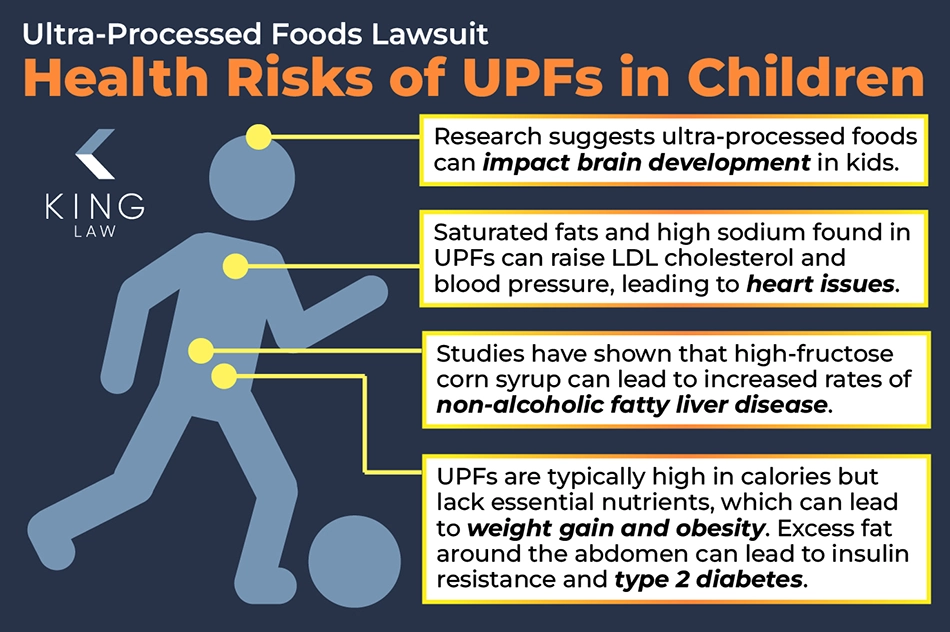
Ultra-processed foods have become commonplace in many pantries throughout America, but many experts believe these products may be bad for children. According to a 2018 research paper, two-thirds of the calories consumed by young children in America come from UPFs. A growing body of research shows that children who eat a large amount of UPFs are at a higher risk of obesity, non-alcoholic fatty liver disease, Type 2 diabetes, and other conditions.
Many people believe that food manufacturers have misled the public about the actual health benefits of their products. Parents and affected young adults are filing lawsuits to get compensation for their family’s losses.
About Ultra-Processed Foods For Children and Teens:
Why Are Ultra-Processed Foods Bad?
How Do Diets High In Processed Foods Affect Kids’ Development?
How Ultra-Processed Foods Lead to Childhood Obesity
How Ultra-Processed Foods Affect A Child’s Liver
How Ultra Processed Foods Affect A Child’s Blood Sugar and Lead to Diabetes
Are Ultra-Processed Foods Really Bad for My Child?
Should I Limit Ultra-Processed Foods in My Child’s Diet?
What Should I Do If I Think Ultra-Processed Foods Led to My Child’s Health Diagnosis?
Why Are Ultra-Processed Foods Bad?
Ultra-processed foods are often not nutritionally balanced, can trigger an addiction to unhealthy eating habits, and often contain additives and artificial ingredients. Instead of being made mostly with whole foods, ultra-processed food creations include extracted sugars, fats, salts, and carbohydrates that have little to no nutritional value.
Eating these foods regularly can have devastating impacts on someone’s health. However, children are particularly vulnerable to these health risks because they are still growing, developing, and consuming more calories in proportion to their size. Conditions linked to childhood diets high in ultra-processed foods include:
- Type 2 diabetes
- Non-alcoholic fatty liver disease
- Heart disease
- Cardiovascular disease
- Certain cancers of the digestive tract
- Obesity
These disorders are impacting children at alarming rates, and the consequences can spill over into the child’s adult life.
What Are Ultra-Processed Foods?
Ultra-processed foods are foods that are made by combining ingredients extracted from other foods or that contain ingredients that are highly processed. Oftentimes, these foods contain high amounts of refined sugars, unhealthy fats and oils, refined carbohydrates, and additives or flavoring agents. UPFs have long shelf lives and are convenient, making them an attractive option for many households with kids.
Examples of Ultra-Processed Kid’s Foods
Many staples of the modern American diet are products that people are aware of as being ultra-processed or junk foods. However, some common snacks and entrées that are marketed as healthy are also UPFs. Examples of foods that people may recognize as ultra-processed include the following:
- Candy
- Store-bought cookies, cakes, and baking mixes
- Sugary drinks
- Sodas
- Chips
- Flavored cheese crackers
However, some seemingly healthy foods are also ultra-processed, which can come as a surprise to some:
- Unsweetened drinks (e.g., drinks with artificial sweeteners and additives)
- Whole-grain breads with added stabilizers, preservatives, and sugar
- Many breakfast cereals (even “healthy” ones)
- Protein bars
- Granola bars
- Pre-packaged fruit snacks and gummies
- Plant-based milk
- Flavored yogurt
- Some frozen chicken nuggets
These foods are often made with modified ingredients rather than whole foods. For example, many store-bought breads (even the whole-grain variety) are a combination of refined and added sugars, flour, preservatives, and starches. Most protein bars are also ultra processed, unless they are made by putting whole foods together without high amounts of processing and additives. The additional processing and additives are the difference between processed foods and ultra-processed foods.

Are Processed Foods Dangerous, Too?
Experts are still determining how to distinguish between processed and ultra-processed foods. Both are modified versions of foods with varying levels (if any) of the whole foods they may have come from.
For example, nut butters and salted nuts are processed, but flavored yogurts and sweetened cream cheese are ultra-processed. Many medical experts are encouraging people to have most of their calories come from whole and minimally processed foods.
How Do Diets High In Processed Foods Affect Kids’ Development?
When a child eats ultra-processed foods regularly, it can affect their physical and brain development. Because children are still developing, their brains and organs are vulnerable to foods that are unnatural in terms of nutritional quality (like foods with added sugars) or where these foods came from (e.g., fake additives or food dyes).
Ultra-Processed Foods and Brain Development in Children
Studies suggest that ultra-processed foods can impact a child’s brain development in addition to their physical health. For example, a 2023 study revealed that children who ate high amounts of UPFs—particularly with high levels of unhealthy fats and sugars—early in life tended to struggle with verbal and math tasks when they were older.
Ultra-Processed Foods and Children’s Heart Health
Eating lots of UPFs also disrupts a child’s ability to convert food into energy, which can cause a child to become obese or overweight. Childhood obesity can also result in type 2 diabetes and other issues, such as raised levels of bad cholesterol and a higher chance of developing cardiovascular disease.
How Ultra-Processed Foods Lead to Childhood Obesity
Researchers have confirmed that UPFs are a common driver of the high childhood obesity rates. Currently, about 20 percent of all children between 2 and 19 in America are obese. UPFs do not have the proper balance of carbohydrates, fiber, natural sugars, and fats needed to maintain blood sugar levels and a healthy weight. Additionally, instead of satisfying a child’s hunger, UPFs tend to provide short-term relief followed by an intense craving for more of those foods.
Studies About Ultra-Processed Foods and Childhood Obesity
A 2023 study explored the link between UPFs and obesity, finding that up to 40 percent of many children’s food intake comes from empty calories. Moreover, the researchers noted that the makeup of UPFs—e.g., added sugars, refined carbs, unhealthy fats, and oils—makes them addictive and triggers unhealthy eating patterns, especially in young people. Another study published in 2024 confirmed these findings, adding that ultra-processed food consumption interrupts a child’s metabolism, which can lead to obesity and other health consequences.
How Ultra-Processed Foods Affect A Child’s Liver
UPFs can increase a child’s waist size and increase their chances of developing non-alcoholic fatty liver disease. This condition causes excess fat to grow around the liver, potentially leading to liver scarring and failure.
Studies About Ultra-Processed Foods and Fatty Liver Disease in Children
Many ultra-processed foods contain high-fructose corn syrup, a common sugar substitute that has been around since the 1970s. A groundbreaking study in 2020 found that a diet with high-fructose corn syrup increased the rates of non-alcoholic fatty liver disease in mice within months of consumption. Researchers noted that the high-fructose corn syrup broke down the mice’s intestinal barriers.
Researchers in a 2023 human study found that UPF intake was correlated with higher rates of non-alcoholic fatty liver disease (NAFLD). The study’s authors believed that UPFs increased obesity and weight gain among children and adults, which led to NAFLD.
How Ultra Processed Foods Affect A Child’s Blood Sugar and Lead to Diabetes
Ultra-processed foods have been linked to an increased risk of diabetes in both children and adults. In 2019, Harvard Health highlighted a six-year study of over 100,000 adults, finding that those who had about 22 percent of their diet consisting of UPFs had a significantly higher risk of type 2 diabetes. These results were consistent even when the researchers adjusted the statistics based on someone’s weight and activity level. Many researchers are discovering similar results in children who eat UPFs as well.
Studies About Ultra-Processed Foods and Childhood Diabetes
Ultra-processed foods may be driving the unprecedented and unexpected rise of type 2 diabetes in children. Historically, young children did not get type 2 diabetes or become obese at the same rates children do today. However, the increase of UPFs in American children’s diets has made obesity and type 2 diabetes more common childhood conditions.
A 2023 research article found that, of the nearly 200,000 participants, type 2 diabetes risk was highest for people who ate ultra-processed breads, sauces, beverages (even unsweetened ones), animal-based products (like pre-packaged ham), and ready-to-eat dishes. The researchers emphasized that those who ate UPFs had an overall higher chance of type 2 diabetes compared to those who do not eat a lot of UPFs, regardless of the type of UPFs they ate. Another study found that participants who had the highest amount of UPFs in their diets had up to a 29 percent increase in their type 2 diabetes risk compared to the other participants.

Are Ultra-Processed Foods Really Bad for My Child?
Despite their widespread availability and popularity, ultra-processed foods can be bad for kids. These foods often initiate an unhealthy and uncontrollable desire for more processed foods, which are often high in added sugars and low in nutritional value. The World Health Organization recommends that no more than 10 percent of a child’s calories come from added sugars. Similarly, having less than 5 percent of a child’s calories come from added sugars can reduce their risk of non-communicable diseases (like obesity and type 2 diabetes).
In short, ultra-processed foods are driving childhood obesity, type 2 diabetes, and non-alcoholic fatty liver disease epidemics. Many health experts and legal scholars believe that food manufacturers are to blame for the public’s misconception about the role and impact of ultra-processed foods in children’s diets.
Should I Limit Ultra-Processed Foods in My Child’s Diet?
Limiting your child’s intake of ultra-processed foods can have enormous benefits on their physical and mental health. Children who are active and eat plenty of whole foods—like single-ingredient foods, fruits, vegetables, and meats—are at a lower risk of type 2 diabetes, cardiovascular disease, obesity, and non-alcoholic fatty liver disease. These lifestyle changes can also improve the health of children who are already diagnosed with these conditions.
What Should I Do If I Think Ultra-Processed Foods Led to My Child’s Health Diagnosis?
If you think ultra-processed foods caused your child to develop non-alcoholic fatty liver disease or type 2 diabetes, you and your family may be entitled to compensation. Many parents are filing legal claims against food manufacturers who may have created ultra-processed foods that are highly addictive. Adults who consumed large quantities of UPFs and who were diagnosed with these conditions when they were children or teenagers are also suing. Evidence suggests that food companies knew UPFs were addictive and harmful, yet they failed to inform the public or adjust their marketing tactics. Contact our team to learn how you can file a UPF lawsuit.

